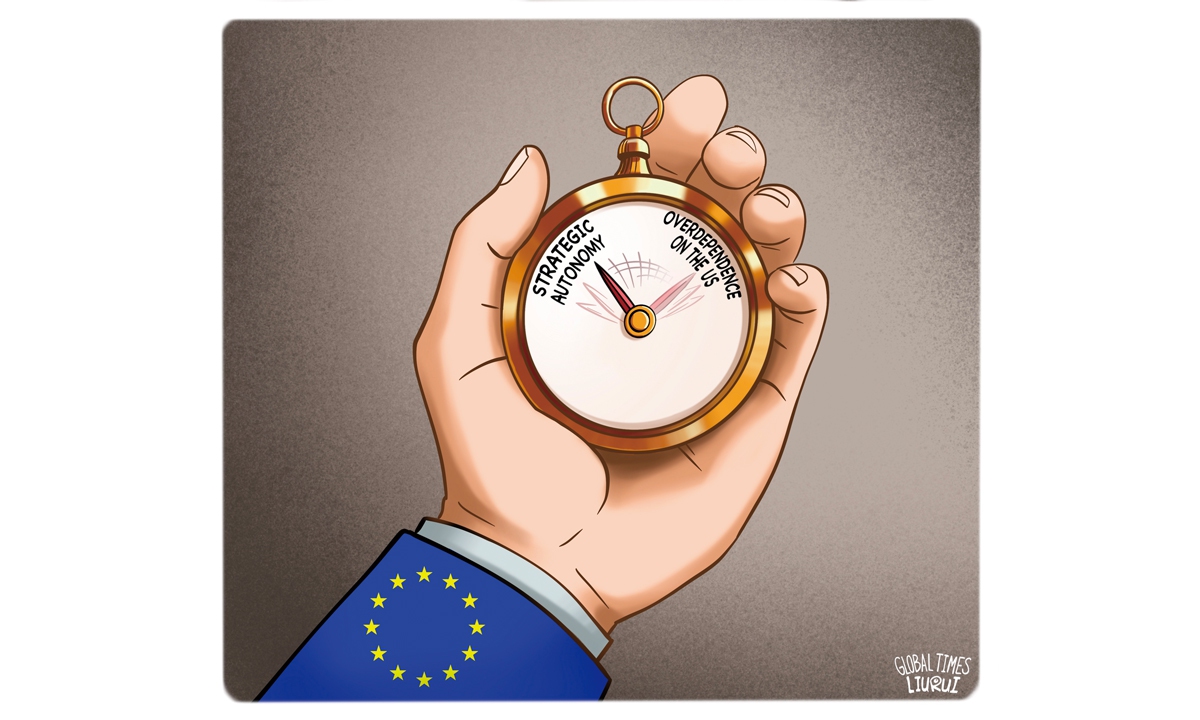
Illustration: Liu Rui/GT
Europe is currently experiencing unprecedented upheaval. From Vice President JD Vance's harsh criticism of "European democratic values" at the Munich Security Conference, to the US bypassing Europe and engaging directly with Russia in talks to address the Russia-Ukraine conflict, to US President Donald Trump's blunt assertion that the EU was created to "screw the US," Europe has faced multiple "shocks" from the new US administration, leading to an exponential increase in pressure. Moving forward, Europe's ability to achieve strategic clarity largely depends on its recognition of its fundamental interests and its approach to managing relationships with both the US and China.
For an extended period, Europe has heavily depended on the US and NATO for its security. However, this reliance is becoming increasingly untenable. As the US seeks to extricate itself from the Russia-Ukraine battlefield, seemingly disregarding European security interests, there is a palpable risk of Europe being abandoned.
In fact, the day after the outbreak of the Russia-Ukraine conflict in 2022, China expressed support for resolving the issue through negotiations between Russia and Ukraine. As the conflict escalated, China firmly opposed the use or threat of nuclear weapons and consistently called for dialogue and consultation to build a balanced, effective and sustainable security framework. If Europe wants to avoid being on the "menu," it should value China's position of "supporting Europe's role in the peace talks."
In the economic domain, Europe has long been heavily dependent on the US for exports. The US has become Germany's largest trading partner, yet it has "weaponized" this relationship by threatening a 25 percent tariff on products such as automotive goods exported from the EU. This move is certain to exacerbate the already sluggish economies of Germany and Europe as a whole. In this context, the German Chamber of Commerce in China and its member enterprises have recently called on the incoming German government to strengthen cooperation with China to help German businesses navigate numerous challenges.
Despite the EU's implementation of politically driven and ideologized "de-risking" policies toward China, China remains open to Europe. In an era marked by rampant unilateralism and protectionism, China continues to introduce a series of high-standard opening-up policies. The recently released "2025 action plan for stabilizing foreign investment" further expands the scope of pilot programs for wholly foreign-owned enterprises, enhances policy support and service guarantees, and accelerates the implementation of projects. If some Europeans still perceive this as a "risk," then it is Europe itself that may ultimately miss the opportunity.
From the perspective of the rules and order cherished by Europe, the US unabashedly interferes in the internal affairs of European countries, discarding internationally recognized principles of engagement when they do not align with its interests. For instance, EU High Representative for Foreign Affairs and Security Policy Kaja Kallas experienced a meeting cancellation during her first visit to the US, with Secretary of State Marco Rubio citing "scheduling issues." Moreover, the US has withdrawn from agreements and organizations aimed at addressing global challenges and also significantly reduced aid to developing countries under the pretext of prioritizing national interests, delivering a severe blow to multilateralism and global governance.
In stark contrast, China always upholds the principle of non-interference in other countries' internal affairs, firmly maintains the international system with the United Nations at its core, and advocates an equal and orderly multipolar world and inclusive economic globalization that benefits all. In the face of global development challenges, China has, over the years, engaged extensively in the Belt and Road Cooperation with the international community, including Europe and its neighboring countries. This cooperation has not only significantly promoted mutual development but also fostered prosperity and stability in Europe and its surrounding regions. These contributions are indeed invaluable and should be cherished by European counterparts.
At this critical juncture, Europe faces pivotal questions: Who are its true partners, and who pose clear threats? These are historical and timely issues that Europe must confront and answer as it moves forward. It is hoped that Europe will use reason and wisdom to clear the "strategic fog" and make choices that align with its long-term interests.
The author is an observer of international affairs. opinion@globaltimes.com.cn




